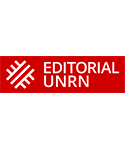
Editorial de la Universidad Nacional de Río Negro - Editorial UNRN
The editorial label of the National University of Río Negro is dedicated to editing, publishing, and promoting works in the academic, scientific, and cultural fields. Its catalog consists of collections that cover various thematic areas, such as: Openings, The Weaver, Learning, Chair Readings, New Horizons, Congresses and Conferences, and Co-editions.
Listing elements from 1 to 0 to 0 elements